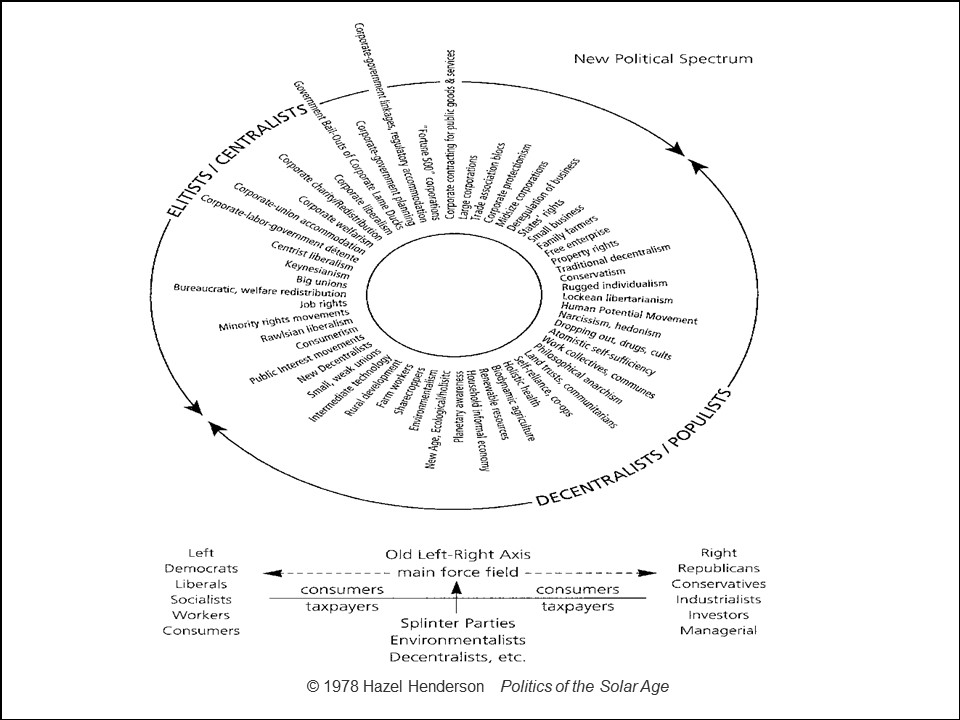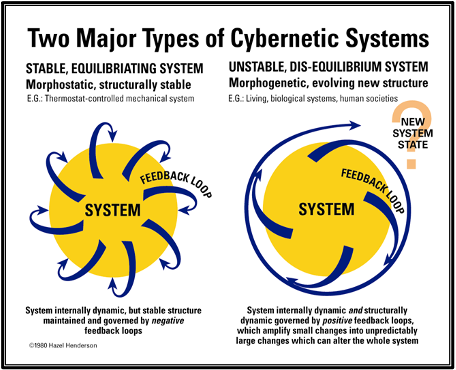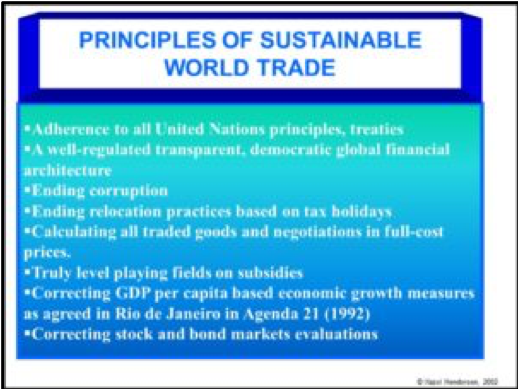"US Voters: Circular Politics Beyond Polarization"
Published 11-19-20
Submitted by Ethical Markets Media

The US 2020 election illustrated once again that independent voters are tired of the two-party red or blue duopoly. Like European voters they are beyond left and right and ahead with new visions of the future. Old memes and battles between capitalism and socialism ended in the past Cold War. Markets survive and are ubiquitous in all human societies. Since earliest times, when they were conducted using shells, wampum, cattle, or in rituals and potlatches, markets evolved using metal coins, silver and gold, then paper, government-issued fiat and now morphing into today’s crypto currencies.
Markets evolved from early individual and community bartering in villages and town squares, then to currency-based trading, national stock exchanges and today’s global satellite and internet-based 24/7 electronic trading and financialization. Few recognize that today’s global financial markets are based on taxpayer-supported public investments in R& D, the internet, fiber optic cables laid under oceans, satellites developed by NASA, as well as all radio, TV, Wi-Fi, and other communications using the publicly-owned airwaves. We drew attention to this rarely-acknowledged debt to taxpayers and how this requires higher standards of all financial markets in the public interest, in our 2010 Statement on “Transforming Finance“ signed by some 100 concerned financial professionals. Today, the pandemic and climate change are driving markets beyond money-metrics and “Transitioning to Science-Based Investing”. While money is exposed as a tool of power in “Fixing the Money Meme”.
As markets expanded in 18th century Britain and Europe, the societal patterns they influenced were mapped approvingly by Adam Smith in his “Wealth of Nations” (1776) as being guided by a benevolent “invisible hand“, along with his earlier caveats in “The Theory of Moral Sentiments“ (1757) in which he stressed the need for ethical interpersonal relations and regulatory oversight by societies in the public interest. Karl Marx weighed in with his “Das Kapital”, (1867), a widely-influential, dour overview of markets’ oppression of workers and international forms of domination he labelled “capitalism“, driven by increasing accumulation , hoarding and enclosure of common global resources. Debates on the role of markets versus the state, individual roles of workers and citizens in democratizing societies continue to this day.
In the 20th century, two world wars and a Cold War were fought over how industrial societies and markets would evolve. The Bank of Sweden lobbied the Nobel prize committee to set up in 1970 its new prize in economics — attempting unsuccessfully to justify this profession as a science. Ideological forces positioned themselves along an imaginary horizontal line from left to right (using terminologies including: communism, socialism, capitalism, fascism, authoritarianism, totalitarianism, libertarianism, populism and anarchism. This 20th century LEFT-RIGHT visualization still dominates political discourse today. It still obscures how actual societies have differentiated into a complex spectrum of views, roles, based on evolving technologies, markets, institutions, education, migration and geographies. (see Paradigm Shift in European Elections).

All of these 19th and 20th century monikers, ideologies and the hot and cold wars they engendered are now morphing into today’s “Information societies“ of our next Solar Age, circular economies. Digital, information-based internet platforms continue colonizing sectors of older material production-based industrial societies. Sector after sector falls to digitization, its destruction of jobs, the insecurity of “gig” economies, self-employment and wholesale unemployment for the less-skilled. First, manufacturing fell to automation in the auto and textile industries in the 1960s, leading to the creation of new visions of “post-industrial, leisure-based societies“ described by the Ad Hoc Committee on the Triple Revolution on the need to maintain purchasing power by guaranteeing basic incomes and equality, “Purchasing Power-Why Basic Income Is A Human Right” (Forbes 2017). President Richard Nixon ordered an early experiment on “universal guaranteed incomes“ and circulated the proceeding of his “White House Conference on the Industrial World Ahead”, (1972). Today, Silicon Valley titans call for such universal basic incomes, to maintain consumers’ purchasing power to buy their products and bolster aggregate demand, but funded by taxpayers, rather than through increasing taxes on social media profits.
All these exponential changes have left economic textbooks, financial courses and MBA curricula based on linear static equilibrium far behind, as described in “Planet Before Profit”, Bloomberg BusinessWeek, Nov. 11, 2019. In this new century’s Information age, traditional stock markets are at last focusing on trading itself as excessive, too fast, as in HFT and computer driven algorithmic portfolios, index funds, ETFs and robo-investments and advisors. Science-denial in trading and speculating still ignores real world risks to societies; inequality, pollution and climate change. Commodity markets’, speculation, including for monocultured food grains, have led to poverty and exacerbated hunger and malnutrition in many countries. Many stock markets are now little more than passive investment platforms for trading between market players of secondary assets, rather than acknowledging the new global threats, widening inequality and the needs for providing funds for real economies on the ground. Macroeconomic statistics exclude other scientific data on global conditions as they view the world from 60,000 feet, providing little understanding of the lives of people in “flyover country”. This GDP-driven global growth has exacerbated much regional and local inequality which led to recent so-called “populist” revolts in many countries, as well as the adoption in 2015, by all United Nations (UN) member countries of the more systemic steering metrics of the Sustainable Development Goals (SDGs). (see also “Steering Societies From GDP’s 7 Deadly Sins to the SDGs Golden Rule).

Activists and politicians in the USA and Europe demands for “Green New Deal“ policies target re-structuring of finance and economies to focus “moonshot“ policies to build out green infrastructure. These policies propose a new social foundation for a just transition for all workers, including support and retraining to fill the thousands of new jobs that will be needed. (see “A Just Transition”, Nick Robins, Grantham Research Institute, LSE, 2019). The US Congress Green New Deal Resolution is widely-supported and endorsed by all Democratic candidates in the 2020 presidential election, buttressed by scientists, engineers, green investors and companies, NGOs and the theoreticians of MMT. In Britain, struggling with its Brexit debacle, seen as a symptom of disastrous “austerity” economics, the Labour Party’s Jeremy Corbin , along with many NGOs, including Positive Money and the New Economics Foundation set forth detailed transition plans to “green” finance and the Bank of England and re-structure their economy more democratically (see “A Green Bank of England”, 2018). Similar efforts to “green” China’s Belt and Road financing of infrastructure are under way (“Decarbonizing Belt and Road“ 2019, Ma Jun and S. Zadek, Tsinghua University Shanghai, China).

The global COVID-19 pandemic is teaching about exponentials and accelerating change in all sectors. Many see the need for reforming incumbent markets and favor government credit to support new greener markets, community cooperatives, credit unions and home-grown local economies embedded in their environments and the society. Many also advocate recognition of all unpaid caring work, which in most countries is the uncounted up to 50% of all productive work in their societies “Love Economies” (Henderson, 1981). Textbook economic theories are further challenged by digitization, and the shift to service economies, digital assets, patents, copyrights, brands, domains and electronic barter. These intangible values, including unpaid care and volunteering, are still uncounted by most economists and accountants, who still focus on tangible goods you can drop on your foot. This shift to “weightless” economies and “capital-light” start-ups is described in “Capitalism Without Capital: The Rise of the Intangible Economy“, by J. Haskel and S. Westlake, (2018). These massive transitions including blockchain-based crypto currencies and business models raise age-old questions: who owns the blockchains and who writes the computer codes, who controls these new businesses and who oversees and regulates all this to protect the public interest? All this re-thinking responds to imminent crises, the pandemic and the effects of climate change, now experienced first-hand in many countries. Circular production and recycling require circular politics.
The Silicon Valley giants’ business models relying on advertising are now challenged from many directions for their ever-deeper incursions into users’ privacy, manipulating personal behavior and addicting our children in the newly-diagnosed: “Gaming Disorder” and digital attention deficit disorders. These “engagement algorithms” designed by psychologists and Stanford University’s Persuasive Technology Lab, focus on emotional arousal, offering ever more sensational stories as clickbait to keep outraged or obsessional viewers glued to their screens. Psychographic targeting of specific audiences as likely buyers or voters use MRIs and deep psychological research, such as that of Cambridge Analytica on Facebook, were used by the Trump campaign in the US 2016 elections, but were initiated by the Obama campaign and Google in the 2012 election. This kind of manipulation of voters, along with “fake news” and Russian bots influenced Britain’s Brexit referendum and is now widely used in many democratic countries. These election strategies are detailed by Kathleen Hall Jameson “Cyberwar: How Russian Hackers and Trolls Helped Elect A President: What We Don’t, Can’t and Do Know”, (2018).
I experienced these kinds of Orwellian campaigns for passive acceptance of technological inevitability in my service as a science policy advisor to the US Office of Technology Assessment (OTA), as our reports upset powerful interests. The OTA was shut down in 1996 by incoming Republican congress members. OTA may soon be revived by Democrats in 2021. A deep battle is being fought over the internet at the International Telecommunications Union (ITU) in Geneva, between the USA, China and Russia (see Restoring Net Neutrality)and as pointed out by A. Klimberg in the Darkening Web and Malcolm Nance in the Plot To Hack America, (2017). The original promise of the internet was of providing an open public forum and information source for all, advancing individual participation and global connectivity. In the USA, allocation of domains was initially overseen by a volunteer group, ICANN, (Internet Company for Assigned Names and Numbers). Now ICANN, a non-profit, dominates internet governance and is challenged for recently allowing the sale of the non-profit .org domain to a private equity group, as reported by Jacob Malthouse in The Nonprofit Community is about to lose $90+ Million Dollars a Year.

How will all these current debates evolve markets in new directions? Digital assets traded over the internet globally along with many electronic barter platforms are further displacing traditional currency-denominated asset valuation on stock markets. Unpaid productive work, long ignored in GDP, along with its missing asset account to record the value of taxpayer-funded infrastructure, R&D and support for startup businesses are finally creeping into mainstream statistics. The UN Human Development Report’s Human Development Index (HDI) found in 1995 that $16 trillion of valuable unpaid work was simply missing from global GDP of $24 trillion. If this unpaid production in all societies ($11 trillion by the world’s women and $5 trillion by men) had been included, global GDP for 1995 would have increased to $40 trillion (www.undp.org).
The unacknowledged taxpayer contributions in R&D and assistance to the private sector for most Silicon Valley giants, is documented by economist Mariana Mazzucato in “The Entrepreneurial State” (2013). Brazil’s insistence that the IMF added to its GDP figures the taxpayer investments in its urban infrastructure, airports, sanitation, universities and hospitals, substantially lowered Brazil’s apparent debt-to-GDP ratio — with the stroke of a pen! These omitted statistics missing from GDP were examined in 2003 at the First International Conference on Implementing Indicators of Sustainability and Quality of Life (ICONS) in Curitiba, Brazil, with over 700 professional attendees from statistical offices around the world (“Statisticians of The World Unite! IPS, 2003).
Economists are still dominant policy advisors in too many governments, in spite of their abject failures to foster more equitable, sustainable economies, or to predict financial crises, including the 2008 meltdown (predicted by many including this author, from other disciplines). Yet all their economic textbook theories have been invalidated by scientific research in thermodynamics, biology, ecology, psychology, anthropology and systems models, as I summarized in “Mapping the Global Transition to the Solar Age: From Economism to Earth Systems Science, Foreword by NASA Chief Scientist Dennis Bushnell, London, (2014). Robert Skidelsky author of the masterwork on Keynes, confirms this denouement of the economics profession’s pretensions to scientific status, in “Money and Governments: The Past and Future of Economics” (2019). Many others have documented economists’ specious use of mathematics to camouflage their untenable, obsolete assumptions, as also described by David Graeber in his review of Skidelsky’ new book in the New York Review of Books, December 5, 2019.

While capitalism may not survive in any of its current forms, markets will continue, since they are deeply coded in the cultural DNA of all human societies. Today, we see new markets and new commons as we explore the evolving global playing field. Markets can be tamed, transformed as they always have been, guided by robust feedback from investors, NGOs, community norms, new regulations at all levels, and by consumers and citizens. Advertising can be regulated, false claims exposed and limited by withdrawing its no longer needed tax subsidies to fund countering exposure, as well as upgraded to educate on sustainability. The profession of psychology can promote higher standards in its code of ethics. Trading can be curbed whenever it becomes harmful to individuals and society and Principles of Sustainable World Trade can be adopted. This will all require systemic changes, reducing the role of money in politics and reforming many features of democratic decision-making and governance.
Humans create markets and are constantly reshaping them as technologies evolve and human awareness expands. For example, global gem mining is now unnecessary, yet still destructive to miners and the environment, (Beyond Blood Stained Gems: New Science and Standards, 2015) The growing global market for identical lab-created gems is gradually taking market share (see www.ethicmarkgems.com).

Humans will need to embrace all the planetary realities in tackling climate change and other global problems arising out of our limited cognition. We are acknowledging that money is not wealth, but merely a useful informational tracking system for our interactions with each other and natural resources. Currencies are social protocols, information, often as tokens, exchanged on internet platforms with network effects determining their prices, as measured by how many people use and trust them, as I describe in “Money is not Wealth: Cryptos v. Fiats“. Crypto currencies can desist from visual fake images of shiny coins to promote sales, since cryptos are actually strings of digits in computer code. We can also agree that prices are always historical and a function of human ignorance. Like all our markets, prices change as we learn more about our real human condition and future possibilities on this small planet.
We are finding that breakdowns drive breakthroughs and that stress is evolution’s tool, evolving all species through environmental conditions and natural selection as Charles Darwin described. Our next technological stage, the Solar Age, is rapidly taking over, along with the primacy of information. Hopefully, information can grow into greater wisdom and lead to more ethical choices both individually and collectively, as we clarify new markets and how our global commons must be shared equitably among our species and with other species in maintaining our living global biosphere.
**********
Hazel Henderson, Author of” Mapping the Global Transition to the Solar Age” and other books in 800 libraries worldwide in over 20 languages, is CEO of Ethical Markets Media Certified B. Corporation , producer of “Transforming Finance” TV series and publishers of the Green Transition Scoreboard www.ethicalmarkets.com
Contact
Hazel Henderson
Ethical Markets
www.ethicalmarkets.com
St. Augustine, FL 32084
904-829-3140

Ethical Markets Media
Ethical Markets Media
* Reforming finance and growing the green economy worldwide* Ethical Markets provides news and perspective on Climate Prosperity, Reforming Global Finance, SRI and more by gathering information from around the world with analysis by our editor-in-chief, Hazel Henderson.
More from Ethical Markets Media

